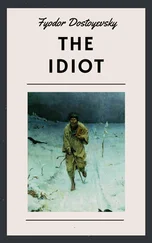Reading Time - Fyodor Dostoyevsky - The Complete Novels
Здесь есть возможность читать онлайн «Reading Time - Fyodor Dostoyevsky - The Complete Novels» — ознакомительный отрывок электронной книги совершенно бесплатно, а после прочтения отрывка купить полную версию. В некоторых случаях можно слушать аудио, скачать через торрент в формате fb2 и присутствует краткое содержание. Жанр: unrecognised, на английском языке. Описание произведения, (предисловие) а так же отзывы посетителей доступны на портале библиотеки ЛибКат.
- Название:Fyodor Dostoyevsky: The Complete Novels
- Автор:
- Жанр:
- Год:неизвестен
- ISBN:нет данных
- Рейтинг книги:5 / 5. Голосов: 1
-
Избранное:Добавить в избранное
- Отзывы:
-
Ваша оценка:
- 100
- 1
- 2
- 3
- 4
- 5
Fyodor Dostoyevsky: The Complete Novels: краткое содержание, описание и аннотация
Предлагаем к чтению аннотацию, описание, краткое содержание или предисловие (зависит от того, что написал сам автор книги «Fyodor Dostoyevsky: The Complete Novels»). Если вы не нашли необходимую информацию о книге — напишите в комментариях, мы постараемся отыскать её.
Poor Folk
The Double
Notes From The Underground
Crime and Punishment
The Gambler
The Idiot
The Possessed (The Devils)
A Raw Youth
The Dream of a Ridiculous Man
The Brothers Karamazov
Fyodor Dostoyevsky: The Complete Novels — читать онлайн ознакомительный отрывок
Ниже представлен текст книги, разбитый по страницам. Система сохранения места последней прочитанной страницы, позволяет с удобством читать онлайн бесплатно книгу «Fyodor Dostoyevsky: The Complete Novels», без необходимости каждый раз заново искать на чём Вы остановились. Поставьте закладку, и сможете в любой момент перейти на страницу, на которой закончили чтение.
Интервал:
Закладка:
And the worst of it was, and the root of it all, that it was all in accord with the normal fundamental laws of over-acute consciousness, and with the inertia that was the direct result of those laws, and that consequently one was not only unable to change but could do absolutely nothing. Thus it would follow, as the result of acute consciousness, that one is not to blame in being a scoundrel; as though that were any consolation to the scoundrel once he has come to realise that he actually is a scoundrel. But enough… . Ech, I have talked a lot of nonsense, but what have I explained? How is enjoyment in this to be explained? But I will explain it. I will get to the bottom of it! That is why I have taken up my pen… .
I, for instance, have a great deal of AMOUR PROPRE. I am as suspicious and prone to take offence as a humpback or a dwarf. But upon my word I sometimes have had moments when if I had happened to be slapped in the face I should, perhaps, have been positively glad of it. I say, in earnest, that I should probably have been able to discover even in that a peculiar sort of enjoyment—the enjoyment, of course, of despair; but in despair there are the most intense enjoyments, especially when one is very acutely conscious of the hopelessness of one's position. And when one is slapped in the face—why then the consciousness of being rubbed into a pulp would positively overwhelm one. The worst of it is, look at it which way one will, it still turns out that I was always the most to blame in everything. And what is most humiliating of all, to blame for no fault of my own but, so to say, through the laws of nature. In the first place, to blame because I am cleverer than any of the people surrounding me. (I have always considered myself cleverer than any of the people surrounding me, and sometimes, would you believe it, have been positively ashamed of it. At any rate, I have all my life, as it were, turned my eyes away and never could look people straight in the face.) To blame, finally, because even if I had had magnanimity, I should only have had more suffering from the sense of its uselessness. I should certainly have never been able to do anything from being magnanimous—neither to forgive, for my assailant would perhaps have slapped me from the laws of nature, and one cannot forgive the laws of nature; nor to forget, for even if it were owing to the laws of nature, it is insulting all the same. Finally, even if I had wanted to be anything but magnanimous, had desired on the contrary to revenge myself on my assailant, I could not have revenged myself on any one for anything because I should certainly never have made up my mind to do anything, even if I had been able to. Why should I not have made up my mind? About that in particular I want to say a few words.
Chapter 3
With people who know how to revenge themselves and to stand up for themselves in general, how is it done? Why, when they are possessed, let us suppose, by the feeling of revenge, then for the time there is nothing else but that feeling left in their whole being. Such a gentleman simply dashes straight for his object like an infuriated bull with its horns down, and nothing but a wall will stop him. (By the way: facing the wall, such gentlemen—that is, the "direct" persons and men of action—are genuinely nonplussed. For them a wall is not an evasion, as for us people who think and consequently do nothing; it is not an excuse for turning aside, an excuse for which we are always very glad, though we scarcely believe in it ourselves, as a rule. No, they are nonplussed in all sincerity. The wall has for them something tranquillising, morally soothing, final— maybe even something mysterious … but of the wall later.)
Well, such a direct person I regard as the real normal man, as his tender mother nature wished to see him when she graciously brought him into being on the earth. I envy such a man till I am green in the face. He is stupid. I am not disputing that, but perhaps the normal man should be stupid, how do you know? Perhaps it is very beautiful, in fact. And I am the more persuaded of that suspicion, if one can call it so, by the fact that if you take, for instance, the antithesis of the normal man, that is, the man of acute consciousness, who has come, of course, not out of the lap of nature but out of a retort (this is almost mysticism, gentlemen, but I suspect this, too), this retort-made man is sometimes so nonplussed in the presence of his antithesis that with all his exaggerated consciousness he genuinely thinks of himself as a mouse and not a man. It may be an acutely conscious mouse, yet it is a mouse, while the other is a man, and therefore, et caetera, et caetera. And the worst of it is, he himself, his very own self, looks on himself as a mouse; no one asks him to do so; and that is an important point. Now let us look at this mouse in action. Let us suppose, for instance, that it feels insulted, too (and it almost always does feel insulted), and wants to revenge itself, too. There may even be a greater accumulation of spite in it than in L'HOMME DE LA NATURE ET DE LA VERITE. The base and nasty desire to vent that spite on its assailant rankles perhaps even more nastily in it than in L'HOMME DE LA NATURE ET DE LA VERITE. For through his innate stupidity the latter looks upon his revenge as justice pure and simple; while in consequence of his acute consciousness the mouse does not believe in the justice of it. To come at last to the deed itself, to the very act of revenge. Apart from the one fundamental nastiness the luckless mouse succeeds in creating around it so many other nastinesses in the form of doubts and questions, adds to the one question so many unsettled questions that there inevitably works up around it a sort of fatal brew, a stinking mess, made up of its doubts, emotions, and of the contempt spat upon it by the direct men of action who stand solemnly about it as judges and arbitrators, laughing at it till their healthy sides ache. Of course the only thing left for it is to dismiss all that with a wave of its paw, and, with a smile of assumed contempt in which it does not even itself believe, creep ignominiously into its mouse-hole. There in its nasty, stinking, underground home our insulted, crushed and ridiculed mouse promptly becomes absorbed in cold, malignant and, above all, everlasting spite. For forty years together it will remember its injury down to the smallest, most ignominious details, and every time will add, of itself, details still more ignominious, spitefully teasing and tormenting itself with its own imagination. It will itself be ashamed of its imaginings, but yet it will recall it all, it will go over and over every detail, it will invent unheard of things against itself, pretending that those things might happen, and will forgive nothing. Maybe it will begin to revenge itself, too, but, as it were, piecemeal, in trivial ways, from behind the stove, incognito, without believing either in its own right to vengeance, or in the success of its revenge, knowing that from all its efforts at revenge it will suffer a hundred times more than he on whom it revenges itself, while he, I daresay, will not even scratch himself. On its deathbed it will recall it all over again, with interest accumulated over all the years and …
But it is just in that cold, abominable half despair, half belief, in that conscious burying oneself alive for grief in the underworld for forty years, in that acutely recognised and yet partly doubtful hopelessness of one's position, in that hell of unsatisfied desires turned inward, in that fever of oscillations, of resolutions determined for ever and repented of again a minute later—that the savour of that strange enjoyment of which I have spoken lies. It is so subtle, so difficult of analysis, that persons who are a little limited, or even simply persons of strong nerves, will not understand a single atom of it. "Possibly," you will add on your own account with a grin, "people will not understand it either who have never received a slap in the face," and in that way you will politely hint to me that I, too, perhaps, have had the experience of a slap in the face in my life, and so I speak as one who knows. I bet that you are thinking that. But set your minds at rest, gentlemen, I have not received a slap in the face, though it is absolutely a matter of indifference to me what you may think about it. Possibly, I even regret, myself, that I have given so few slaps in the face during my life. But enough … not another word on that subject of such extreme interest to you.
Читать дальшеИнтервал:
Закладка:
Похожие книги на «Fyodor Dostoyevsky: The Complete Novels»
Представляем Вашему вниманию похожие книги на «Fyodor Dostoyevsky: The Complete Novels» списком для выбора. Мы отобрали схожую по названию и смыслу литературу в надежде предоставить читателям больше вариантов отыскать новые, интересные, ещё непрочитанные произведения.
Обсуждение, отзывы о книге «Fyodor Dostoyevsky: The Complete Novels» и просто собственные мнения читателей. Оставьте ваши комментарии, напишите, что Вы думаете о произведении, его смысле или главных героях. Укажите что конкретно понравилось, а что нет, и почему Вы так считаете.












